

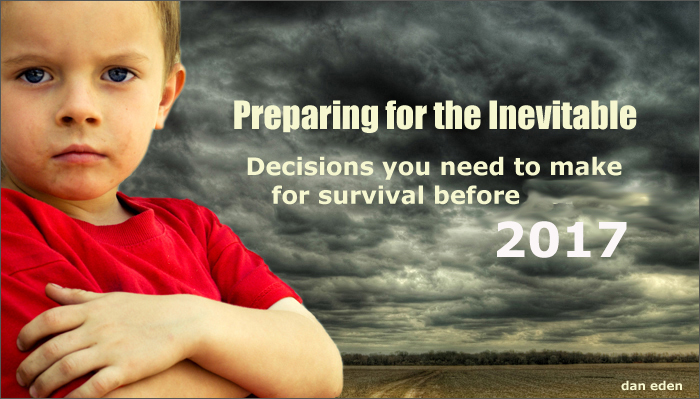
Preparing for the Inevitable
By Gary Vey
Part 2: Living Without Electricity || Part 3: Water, the Source of Life Part 4: Eating Dog Food? || Part 5: Money and Barter 
I've gathered some good information about planning for today's dangers. A pdf file can be downloaded on each page. Misconceptions about December 21, 2012 I get lots of e-mails asking what will happen on December 21, 2012, the so-called "end of the world" day. As we get ever closer to that day, it's getting clearer that the only problems facing the world are those that we have made ourselves. We are a species that doesn't seem to get along with itself. We've become too self-centered and short sighted. Our reliance on non-renewable and dangerous energy is our Achilles heel. I guess what I'm saying is that it doesn't take a global catastrophe of biblical proportions to "end" your own immediate world. An outage of electrical power can be life threatening if it is prolonged. So it's best to be prepared. Back to the Garden Not everyone believes that the "end" will happen, or that it will necessarily be a bad thing. Some people feel that a "transition" to some new reality -- a better one -- awaits us and that the "end" refers to our present way of life. They believe that our future will be less dependent upon material, technological and self-centered philosophies. In the words of songwriter, Joni Mitchell (Woodstock), we will "get back to the garden."
The earth has had many mass extinction events. In retrospect, we can view these as both good and bad. The dinosaurs extinction was bad for them, but made it possible for mammals to evolve into humans. The ice age fostered "survival of the fittest" and improved the intellect and stamina of our species.
"If it does not kill me, it only makes me stronger." But before we can enjoy any new earth, we have to survive the transition. Where is the best place to be... city or country? Not near an ocean coastline. While there is debate about the type of natural disaster that we could see, the general consensus is that you shouldn't be near an ocean coastline. Things such as meteor impacts and massive earthquakes can cause tsunamis. Most scientists advise being from 30 to 50 kilometers from the water.
"The concept most fundamental to long term disaster preparedness, in retreating, is having a safe place to go to avoid the concentrated violence destined to erupt in the cities. When you have a growing apprehensive awareness that the time grows short for you to relocate away from areas of greatest danger, then choose [where you will live] carefully." -- Mel Tappan Move away from the city.
If you live in a city, you would be well advised to have a plan to move out from all heavily populated areas. There are a number of reasons why this is a good idea.
Scarcity of food Supermarkets generally stock three normal days worth of goods on their shelves. Most supermarkets will be depleted within a few hours of a major event. Restaurants will be closed as the owners and workers flee to be with their own families. People who live in the city and have no option to escape (i.e. no car, transportation shut down) will inevitably become desperate and violent. Hunger is a powerful motivator. Anarchy While food riots break out, civil services such as police and fire departments will break down and become ineffective. We saw this during hurricane Katrina. Police and fire workers felt obligated to take care of their own families and failed to report for duty. Widespread looting ensured, mostly perpetrated by ordinary citizens who were just trying to survive. Even nursing home and hospital workers abandoned the sick and dying. In NYC after hurricane Sandy, looting and home invasions happened. People disguised as electrical workers systematically robbed citizens without power, eating their food and taking their cash.
Once there is a breakdown of civil order you will not be able to go outside of your residence after dark. Desperate people will know that you are most vulnerable then. Although the percentage of pathological rapists, murderers and sadists is small, in a dense city population there are enough of these types of people to cause alarm. Without the consequences of law enforcement, they will feel little inhibition to acting on their impulses. Even good people, feeling the need to survive, will be driven to break-ins, robberies and assaults. You will likely stay inside your abode at night. And when your resources are all consumed, you will likely join the other "good people" outside, doing whatever is needed to survive. Circle the Wagons Lots of people, in the face of hurricanes or fires, are reluctant to leave their dwellings because their "stuff" is there. Some have elderly family members or even pets that can make moving a real problem. So they decide to stay where they are.
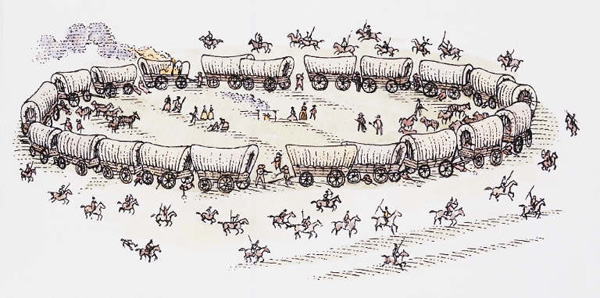 An analogy can be found in the days of the covered wagons on the Oregon Trail. Each wagon was a home unto itself, with limited supplies and often carrying women, elderly and children. When they were facing impending attack, either by the elements, high wind, dust storms or even Indian attacks, they found safety in numbers. The wagons would be arranged in a circle [above] while the family groups collectively fought off the enemy and shared their resources. This same method can be effective in a city environment also. Instead of wagons, city blocks, apartment buildings or even sections of residential complexes can find strength by banding together. But it requires a plan and often some type of leadership role to organize and assign duties for protecting the perimeter (i.e. who is allowed inside?) and distributing the resources. Although it can be done, it is extremely difficult. City dwellers tend to be individualistic and a bit paranoid of their neighbors even in the best of times. Green Acreas and Roving Bands of Hungry City Dwellers
Country dwellers may initially escape the mayhem of urban anarchy, roaming hungry gangs and looting, but eventually their isolated sanctuary will become the target of these same types of people. The goal of the country invaders is likely to be more than robbery or a quick meal. They may wish to take over the residence -- if only because there is no other option for their survival. Being isolated means that law enforcement is slow to respond, so survival in the country means that, in addition to securing food and water, some type of arms (guns) will be needed. This may not feel right for many people, but a group of hungry and desperate men with knives, invading your country home and harming your wife and kids will soon make you change your mind. Man's Best Friend One of the best things you can have in the country is a dog. They have an uncanny ability to "smell" the intent of a stranger. This is important because many of the people who will try to invade your country dwelling may look perfectly normal. I'm going to include some excellent advice from an internet blogger, Ferfal, who reported about these things during the social and economic decay in Argentina.
We appreciate your comments and suggestions in this series. Please reply using the link below:
 
Reader's Comments: Hi Dan, Good that you are bringing this need for readiness to the public. You will not find the media discussing this because they are really not in the "information" business. They are rather in the advertising business. This kind of needed talk doesn't set well with selling automobiles.
Sure, you should think about the future, where you will go and who you will be with. But life sometimes throws quick punches at us and it may be that you have no time to make elaborate plans... Maybe you live down near the Gulf of Mexico and a toxic gas cloud from the oil spill is heading to your neighbohood... or maybe you turn on the news and learn that Israel has nuked Iran and they retaliated with more nukes and the whole damned world is going crazy. This is what a bug out bag is for. You need something that you can have ready to grab as you are running out your door. Each person in your family should have one. Preferably this is a backpack -- something you can strap on your back because you may need your arms and hands to climb or help others. Inside the bag you should have everything you need to survive for three days -- at least. Many people have given lots of thought to what you should have in your bag. This has come from experience, so the list is something you need to consider seriously:
These are the basics. Add more depending on what you can carry and what you anticipate in your own particular area of the world. Passports and important identification papers should be in a water proof pouch... think I thought of everything. Please post this, Dan, as it is really important. M.S. There have been many events in the last 200 years much more significant than anything we are seeing now (krakatoa eruption, Carrington event, WWII, 1918 pandemic, The Great Deprssion, etc). The world did not end then, so why should the recent, less significant, events spell an imminent doomsday? J.P.S. I think a little too much attention is focused on the "worst case" scenario when a more drawn out catastrophe is more probable Patience, planning, and common sense will become valued resources again. Trying to get-out in front of a panic can get you trampled in the stampede it starts. Don W.
 
|
Editor/viewzone.com
myristicin@hotmail.com

This article shows you how to "read" the eyes of your lover, boss or politician. It's the same tried and tested method used by Homeland Security, the police and FBI.
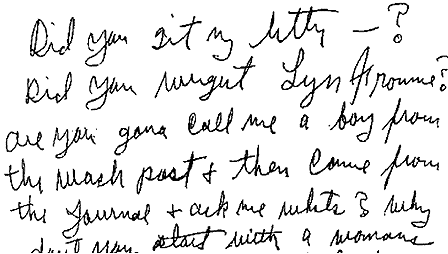
Learn everything about handwriting analysis in these free viewzone lesson by a professional!

Each person's fingerprint is unique. Exactly how do they match them so quickly?

What do your color preferences reveal about your hidden personality. See what advertisers and marketing professionals have known for decades.
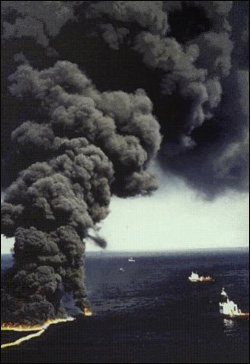 If you were suddenly given fifteen minutes to gather your belongings and leave your home, would you be prepared? What would you bring? And what if the electrical power was down for many weeks... Could you and your family survive the ordeal?
If you were suddenly given fifteen minutes to gather your belongings and leave your home, would you be prepared? What would you bring? And what if the electrical power was down for many weeks... Could you and your family survive the ordeal?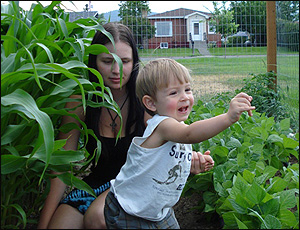 The "garden" idea is one full of hope and healing. We have come a long way from the Garden of Eden. The planet has been used and abused and certainly needs to be healed. Some type of great cataclysm would certainly do this. And it wouldn't be the first time.
The "garden" idea is one full of hope and healing. We have come a long way from the Garden of Eden. The planet has been used and abused and certainly needs to be healed. Some type of great cataclysm would certainly do this. And it wouldn't be the first time.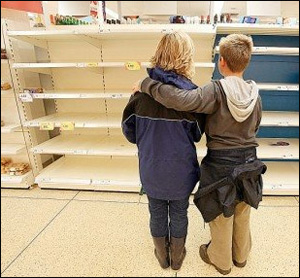
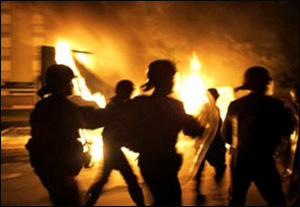 Restriction of movement.
Restriction of movement.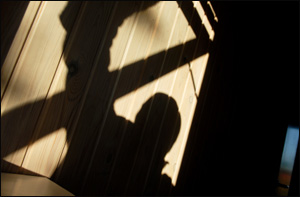 Living in the country is better than in the city -- but it has some problems also. The one that tops the list has to do with all the city people who decided at the last minute to move to the country!
Living in the country is better than in the city -- but it has some problems also. The one that tops the list has to do with all the city people who decided at the last minute to move to the country!
 To those that believe that they will never need help from anyone because they will always have their rifle at hand, checking the horizon with their scope every five minutes and a first aid kit on their back packs at all times.... Grow up."
To those that believe that they will never need help from anyone because they will always have their rifle at hand, checking the horizon with their scope every five minutes and a first aid kit on their back packs at all times.... Grow up."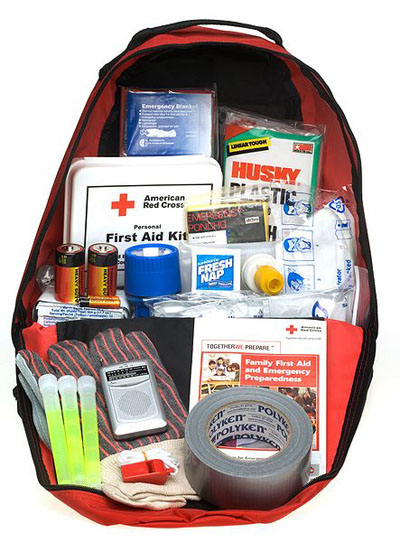 But I am writing because you maybe have forgotten a very important thing that everyone should be doing right now! I'm speaking about what is called a "bug out bag."
But I am writing because you maybe have forgotten a very important thing that everyone should be doing right now! I'm speaking about what is called a "bug out bag."